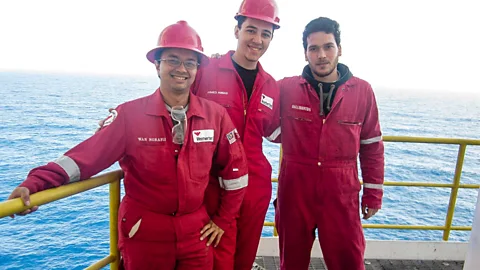By Kate Mayberry, Features correspondent
 Getty Images
Getty ImagesExpatriates from Asia are growing in demand over those traditionally from the West. Kate Mayberry explores this changing demographic trend.
Wan Norafli Razali leaves the restaurant and strolls around to the left-hand side of his car to open the door. Then he remembers. He’s back home in Malaysia and the driver’s seat is on the other side. “See,” he chuckles. “I’ve been away a long time.”
The 38-year-old chemical engineer, who likes to be known as Afli, lives in Dubai with his family and works with the Lubrizol Corporation, an American oil-field services company. He’d always dreamed of a career overseas.
After graduating from university in the United States in 2001, he worked in his native Malaysia before moving back to the US in 2006 when he got a job with oil services company Schlumberger. It wasn’t the full expat package, but he got a good salary, housing and transport, he says.
“I wanted to live in the States forever,” he recalls, nibbling on some McDonald’s French fries. “I was living the American dream.
“The motivation was to work overseas and get as much experience as possible.”
 Wan Norafli Razali
Wan Norafli RazaliA decade on, he works with expats from all over the world. “Your boss might be from South Korea, your engineer from China, your trainee from America and then you have the local Arabs. It’s quite a good blend.”
That’s a stark change to the past, when expats were typically Western middle-aged married males. Today, expats are just as likely, if not more so, to be Asian.
“The demographics of the typical expatriate employee [has] changed,” global location services firm ECA International noted in its 2016 Managing Mobility Survey. “Asia [is] just as likely to be a source of expatriates as Western Europe or North America.”
The Eastern shift
It’s a trend that’s linked to the global expansion of Asian companies, which started when the Japanese ventured overseas in the 1980s. It picked up momentum after the 2008 financial crisis after China joined the fray.
“Asian companies are more likely to send staff overseas than Western companies,” says Lee Quane, ECA’s regional director for Asia. “A Western company will probably send a handful of managers and recruit locally. Asian companies tend to send more staff, even at junior level. China is an obvious example but also Japan and Korea. They’ll send senior management, mid-management and even junior management and professionals. Part of that is about communication, but it is also a trust issue.”
Many Asian companies — China, Korea, Japan and India — have what ChapmanCG, a global recruitment firm that specialises in HR roles, calls a “very strong local talent agenda.” In other words, they want to hire people from their own countries, train them and put the best of them in senior roles.
In South Korea, international experience is seen as a prerequisite for promotion to the top jobs in major corporations. In mainland China, the government is urging its biggest companies to expand internationally as part of its “Going Out Policy” — the result has been a slew of mergers and acquisitions, and Chinese companies opening offices in cities across the globe. Mostly, they are staffed by people seconded from headquarters in China itself.
 Getty Images
Getty ImagesA mobile workforce
As demand for Asian talent has increased, so Asians themselves are more willing than ever to go abroad in order to further their career.
Global recruitment firm Hays Asia, which recently conducted a poll across the five Asian countries where it operates, found Singapore had the most globally mobile workforce, with 97% prepared to get a job overseas. Of those, 85% said they would leave for better job opportunities, career development and exposure.
In China, 96% said they were prepared to leave for a position abroad, followed by Hong Kong at 94% and Malaysia at 93%.
“Professionals seeking to gain a job overseas are aware that employers increasingly value local talent with international experience and an international mindset,” says Christine Wright, Hays Asia’s managing director. “When they return they can offer a combined globalised way of thinking, and experience of how business is done overseas, with local cultural understanding.”
It’s an advantage
Eric Yap, 42, agrees. Yap studied electrical engineering at the University of Missouri, Columbia in the US and had planned to return home to Malaysia after he graduated.
But a study year he spent in Japan ended up setting him on a different path, and he joined Goldman Sachs’ IT division in Tokyo immediately after graduating. Now working with Amazon Web Services, he’s been there ever since.
“I came to the conclusion that any sort of practical experience would likely be an advantage if I chose to return to Malaysia someday, especially [with] opportunities at global corporations in Malaysia,” he recalls over email. “However, I had never planned on staying this long in Japan.”
 Getty Images
Getty ImagesYap adds that he’s found that people who are multilingual (he speaks four languages) and who have the cultural sensitivity to work effectively with people from other countries are in ever greater demand.
Matthew Chapman, chairman of ChapmanCG, agrees that those who’ve worked abroad have experience that is “highly sought after,” especially in Asia where economies are growing far more quickly than Europe or North America.
“There’s a lot more respect these days for the Asian way of doing things, and for global leaders who have spent time in Asia,” Chapman says. “They are the ones who are going to get promoted. There is an appetite for strategies and ideas that are coming from the region.”
His colleague, Foo Siew Chin, agrees. Since she returned to Singapore two-and-a-half years ago she says she’s noticed more Asian companies are talking about developing their own talent, rather than hiring outside.
“It’s not just about Asians knowing Asia better, it’s also from a corporate and diversity perspective,” explains Foo, who works alongside Chapman. “When companies look at the leadership slate they are increasingly aware that they need to have a more diversified leadership team in Asia.”
Minding costs
The changing profile of the expatriate also comes as companies become more mindful of the costs associated with expatriate postings. In many cases, “home” flights have been downgraded to economy rather than business, housing allowances are more likely to cover a flat rather than a house, and accompanying children may no longer have their school fees paid.
In its survey, ECA found many of the Asian expats were on shorter assignments and that four of 10 travelled without their families.
 Alamy
Alamy“A lot of companies are scrutinising the cost of expat packages,” says Chapman. “They are useful if there’s a critical gap that really cannot be filled in that jurisdiction. But the Asian talent base and the foreigner base on local terms has got a lot richer. There has got to be a really good reason to have a [traditional] expat on an expat package with the house, the flights and the car.”
In Dubai, Afli and his family expect to return home to Malaysia eventually, but wherever they move next, the decision is likely to be guided less by money and benefits, and more by family concerns.
“When you get older you have different objectives,” he reflects. “Before it was just the money, but when you have kids, its education, religion and your wife. Is she happy? If not, you’re not going anywhere.”



